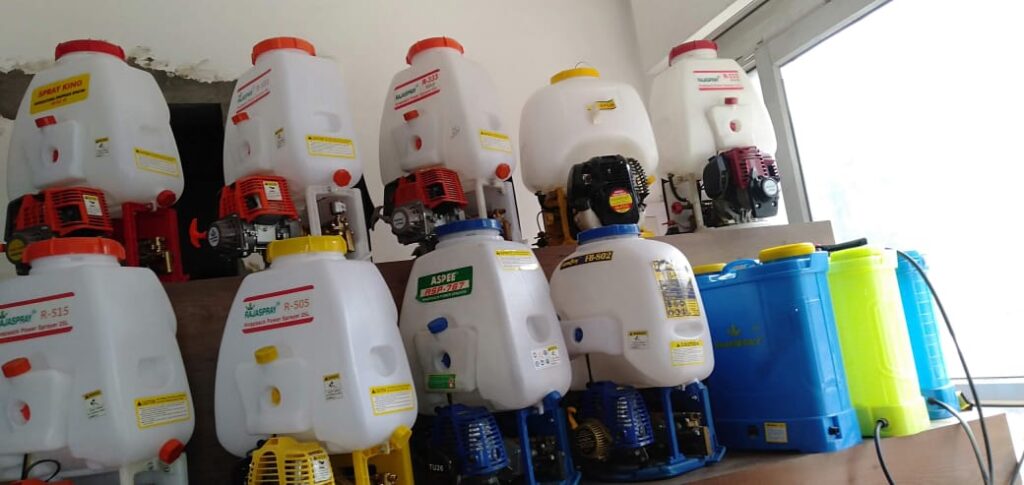Introduction
Agriculture is the backbone of food production, and the efficiency of farming operations plays a crucial role in ensuring bountiful harvests. One of the most vital tools in modern agriculture is the sprayer pump—the driving force behind effective pesticide, herbicide, and fertilizer application. From small-scale farms to vast agricultural fields, sprayers ensure that crops receive the necessary treatments efficiently and precisely.
In this guide, we’ll explore different types of agricultural sprayers, their applications, and essential maintenance tips to help farmers make the most out of their spraying equipment.
What is a Sprayer Pump?
A sprayer pump is a device that generates pressure to propel liquid solutions, such as pesticides, insecticides, herbicides, and fertilizers, through nozzles onto crops. Sprayer pumps come in various sizes and designs, ranging from handheld devices to sophisticated tractor-mounted systems. The selection of the right sprayer depends on factors like farm size, type of crops, and spraying requirements.
Types of Agricultural Sprayers and Their Applications
Different types of sprayers are designed for various farming needs, including crop protection, weed control, and fertilization. Let’s take a look at the most common types:
1. Knapsack Sprayer
A knapsack sprayer is a backpack-style sprayer ideal for small to medium-sized farms. It consists of a tank, a pump, and a nozzle held by the operator.
Types of Knapsack Sprayers:
Manual Knapsack Sprayer: Hand-operated, economical, and suitable for small areas.
Battery-Powered Knapsack Sprayer: Runs on a rechargeable battery, reducing manual effort and ideal for larger areas.
Motorized Knapsack Sprayer: Powered by a gasoline engine, providing high efficiency for extensive agricultural use.
Applications:
Spraying pesticides, herbicides, and fertilizers in fields and gardens.
Pest control and disinfection in commercial settings.
Weed control in agricultural and horticultural areas.
2. Portable Power Sprayer
A portable power sprayer is a lightweight device equipped with an electric or petrol engine. It does not have a built-in chemical tank and is typically used with a hose pipe.
Features:
Motor-driven pump for continuous spraying.
Adjustable pressure settings for various applications.
Available in different tank sizes (5L-20L).
Applications:
Large-scale agricultural spraying.
Greenhouse and nursery spraying.
Public disinfection and sanitization.
3. Knapsack Power Sprayer
A knapsack power sprayer combines the portability of a knapsack sprayer with the power of a motorized pump.
Features:
Engine-powered pump (2-stroke or 4-stroke petrol engine).
Tank capacity of 12L-20L.
Adjustable nozzles for different spray patterns.
Applications:
Efficient crop protection against pests and diseases.
Fertilizer and nutrient application in large farms.
Weed control and public sanitation.
4. Mist Dust Sprayer
A mist dust sprayer disperses liquid chemicals in mist form and can also spray granular fertilizers.
Applications:
Quick spraying in orchards, tea and coffee plantations.
Application of dust-based pesticides.
Effective pest and disease control.
5. HTP (High-Pressure Triplex) Sprayer
An HTP sprayer consists of a high-pressure triple-piston pump, primarily used for uniform spraying over large agricultural areas.
Features:
High pressure for extended coverage.
Available in battery, manual, and hybrid models.
Long operational life and efficient power consumption.
Applications:
Commercial and large-scale agricultural spraying.
Pest control and irrigation.
High-volume spraying for plantations.
6. Orchard Sprayer
An orchard sprayer is a tractor-mounted system designed for spraying pesticides and nutrients in orchards.
Features:
Covers large areas quickly.
Adjustable nozzles for targeted spraying.
Suitable for fruit trees and vineyards.
Applications:
Spraying plant growth regulators and pesticides in orchards.
Disease prevention in large farms.
Nutrient application for better yield.
Why Sprayer Pumps are Essential for Efficient Farming
Sprayer pumps enhance farming efficiency by ensuring precise and uniform application of chemicals, reducing wastage, and improving crop protection. Here are some key benefits:
.Precision Application – Ensures even coverage of pesticides and fertilizers, reducing waste and improving effectiveness.
.Adjustable Pressure – Allows users to control pressure levels for different spraying needs.
.Versatility – Compatible with various nozzles and spraying techniques for different crops.
.Efficient Delivery – Minimizes environmental impact by reducing chemical runoff and drift.
.Ease of Use – Modern sprayers are ergonomically designed for user comfort and productivity.
Maintenance and Care of Sprayer Pumps
To maximize the lifespan and efficiency of a sprayer pump, regular maintenance is crucial.
1. Regular Cleaning
Rinse the tank, hose, and nozzle after each use to prevent residue buildup.
Use mild detergent and clean water for thorough cleaning.
2. Lubrication
Lubricate moving parts like pistons and valves as per manufacturer recommendations.
3. Inspect Components
Check for leaks, cracks, and worn-out seals.
Replace damaged parts promptly to avoid breakdowns.
4. Filter Maintenance
Clean or replace filters regularly to prevent clogging and ensure smooth operation.
5. Pump Calibration
Periodically calibrate the pump to maintain accurate application rates.
6. Proper Storage
Store in a dry and cool place to prevent corrosion and damage.
Cover the sprayer to protect it from dust and dirt.
7. Winterization
Drain all liquid from the sprayer before storing it in cold weather to prevent freezing damage.
Conclusion
In the ever-evolving field of agriculture, sprayer pumps stand as an indispensable ally, helping farmers ensure the health and productivity of their crops. Whether it’s a small garden or an extensive agricultural operation, selecting the right sprayer pump can make a significant difference in efficiency, yield, and cost savings.
By understanding the different types of sprayers, their applications, and proper maintenance, farmers can optimize their spraying operations for a more sustainable and profitable farming experience.
For high-quality sprayers and expert advice, visit Des Raj Darshan Kumar—your trusted partner in agricultural equipment!

